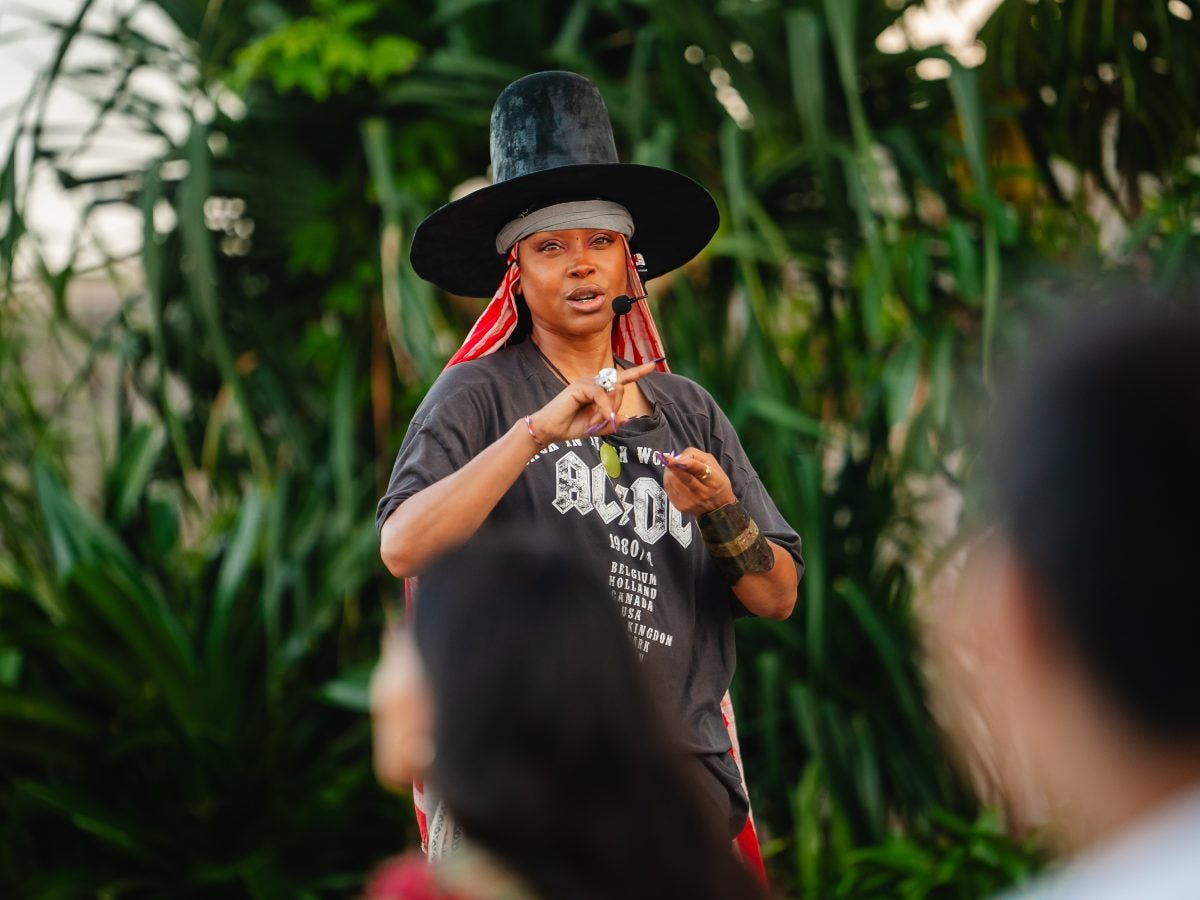
As the morning light brilliantly ushers in a new day over the ethereal views of Sunset Park at Desa Potato Head Bali, hotel guest Robyn Hillman-Harrigan quiets her mind for a meditative breathwork session with Fa’ Pawaka and Gato Latex at the Merasa Festival.
“Breathing is something I think that we easily take for granted. I have a regular breathwork practice that I attend at a gym close to home in Melbourne. As a Black woman born and raised in New York with so much hyperactivity, I find that practice to be really grounding,” the Australia-based financial therapist explains as she adjusts her yoga mat.
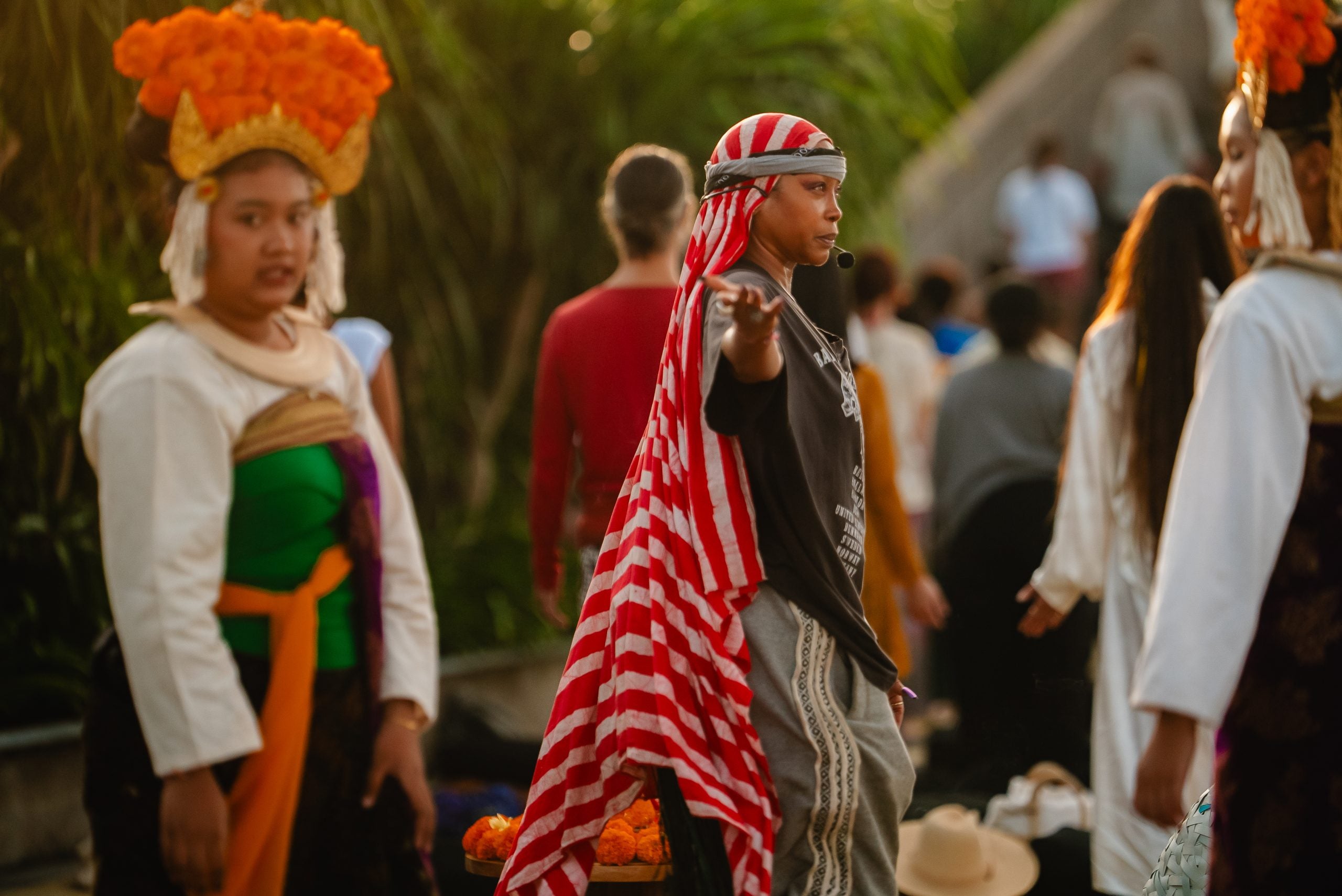
The hypnotic, ambient sounds of the bonang (an Indonesian instrument made of small gongs) paired with nearby crashing beach waves fill the crisp, dawning air – setting an inviting mood for the two dozen participants for the session. That lifestyle adjustment, centering breathing, Hillman-Harrigan goes on to note, was no easy feat. But she has found balance by frequenting Indonesia in her travel pursuits.
“People pay more attention to ceremony, community and rituals here in Bali, which is a huge difference from The West – because you have to slow down here, in the now. Breathwork teaches you a lot about your unhealthy habits and the healing that is needed to center, prioritize, and optimize your wellness.”
Merasa – an Indonesian word that loosely translates to “experience or being aware of an emotion or sensation” – is a most fitting descriptor for the festival, co-curated for the 2024 edition by Grammy-winning singer and songwriter Erykah Badu and the majestic Potato Head Resort, founded by Ronald Akili. The innovative week-long agenda brings together practices around health, music, fitness and creativity, while reinventing the ideas around wellness and regenerative tools to guide the human journey.
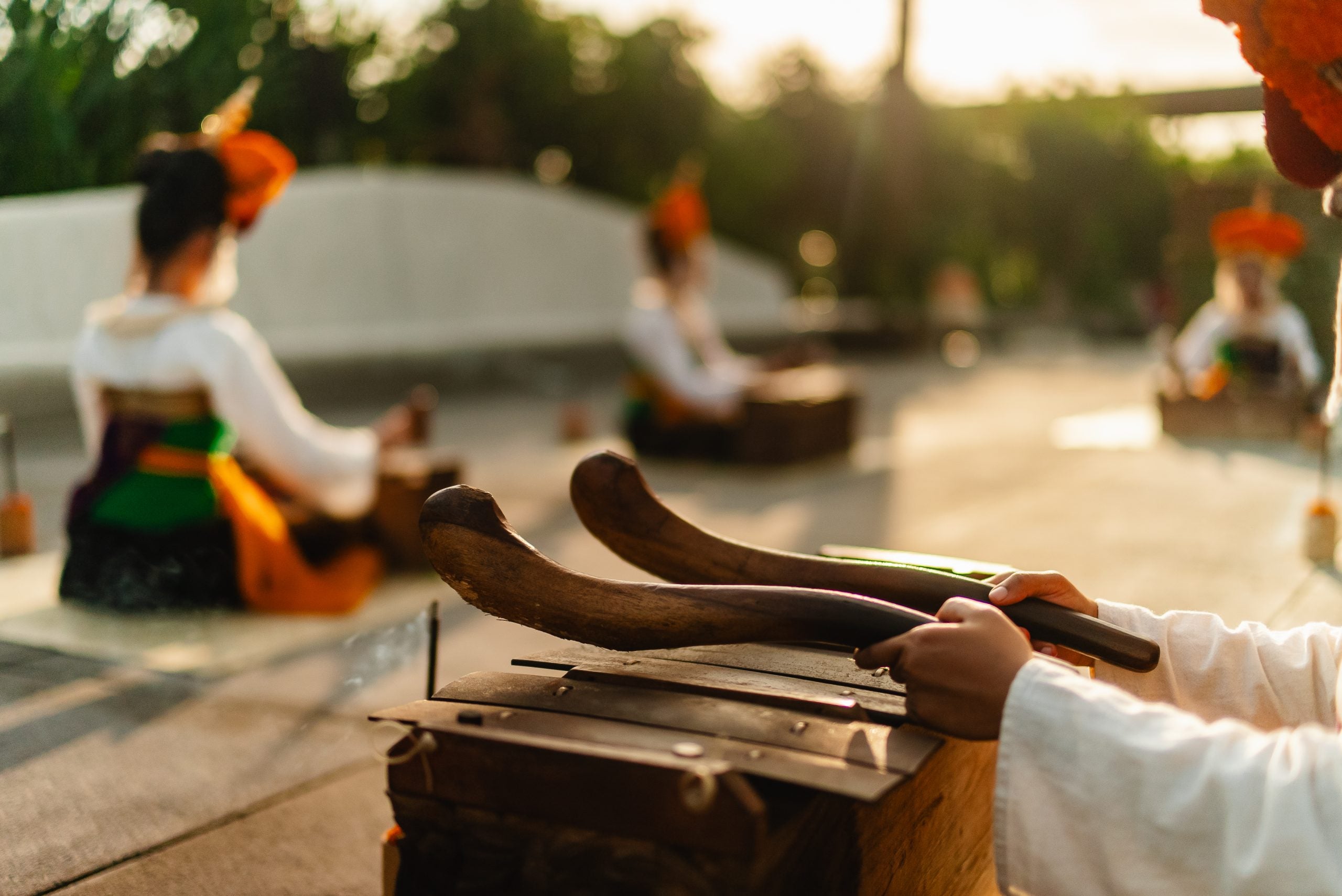
For Badu, harmonizing with nature and self on the “Island Of Gods” and working with the right partners is a crucial aspect of the experience at Potato Head, named one of The World’s 50 Best Hotels and well-known in global hospitality circles for championing sustainable practices throughout its property that protects the environment and encourages community tourism.
“This retreat is not the wellness; this is just the evidence. You start your wellness journey when you decide to be well – and you start it one little thing at a time. It could be the words you decide to allow into your mind, or making sure that you keep your boundaries. You can start that journey at any moment or at any time, and you can start over at any moment,” Badu explains in a mid-morning sit-down with ESSENCE. The programming at Merasa Festival intuitively reflects the generosity and kindness interwoven into the delicate fabric of Balinese culture. There is no competition for the best performance – only a peaceful presence of a community that encourages you to simply come as you are. From curious beginners to more experienced practitioners, participants from around the world flock to the annual event to experience a wide range of activities and sessions.
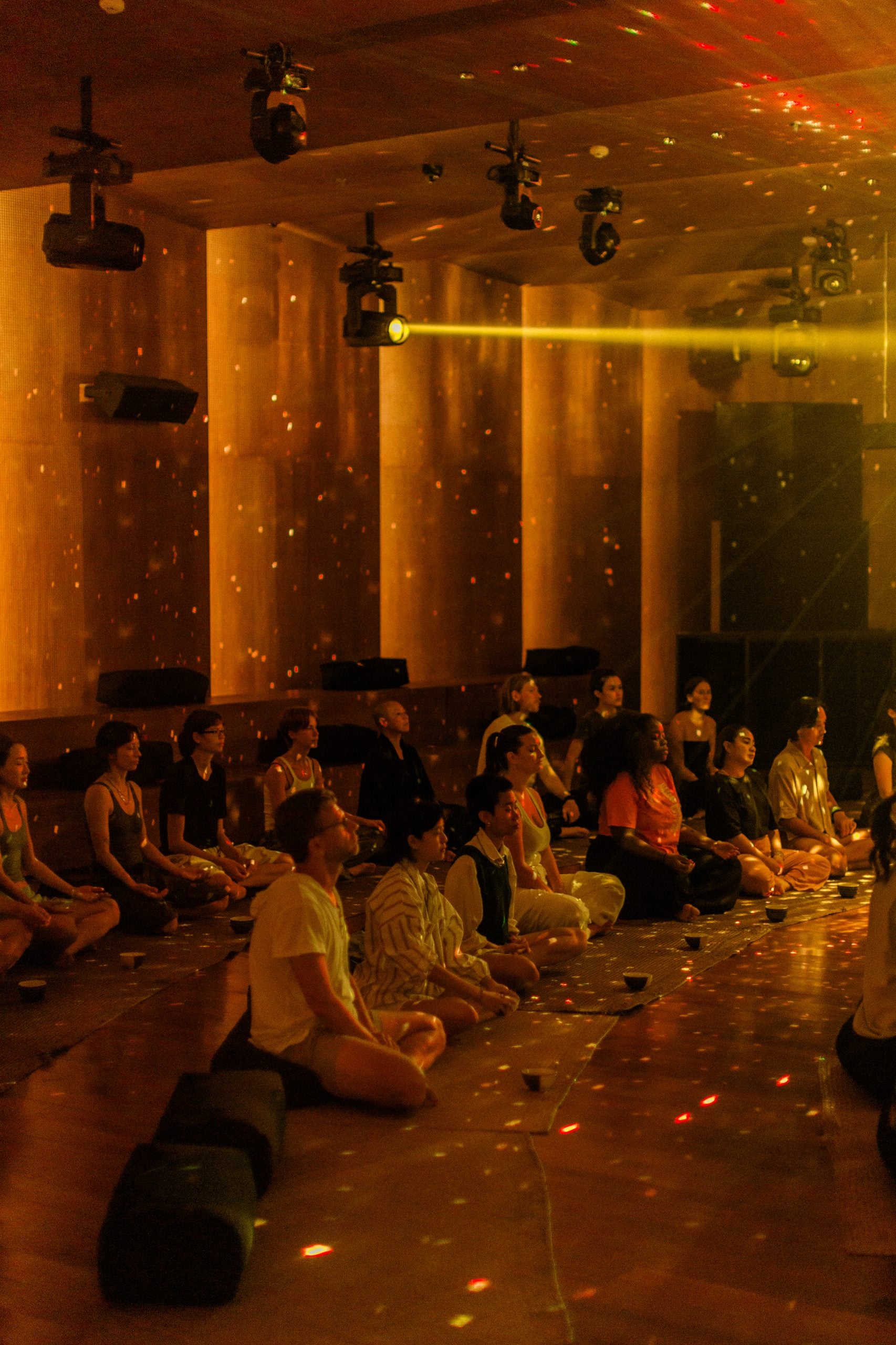
An invigorating electric yoga session challenges novices and yogis of varying degrees to move in alignment with the electronic frequencies of “fractal” – a mathematical term used to describe geometric shapes containing a complex structure of scales. Disconnecting from the pace of the world and celebrating the human form is made easy with the intuitive movement workshop: a no-judgment zone where dance doubles as a transformative communicative tool for expression. A light sound vibration session becomes a sanctuary to explore deeper levels of consciousness as class members meditate on custom-made water beds with vibrational speakers, made complete with a synchronized, awe-inspiring light show. Guests could even alight their curiosity with the fire ceremony – a cleansing ritual shrouded in the Bamboo Garden on the property.
With this undeniable connection between nature and nurture, Badu, a certified Reiki healer and doula, reveres the people of Bali as a community that stays rooted in its traditions and who actively chooses to live well by showing up for others. “It has been nothing but family. I was greeted with a temple blessing. They wrapped me in a sarong and presented me with gifts of flowers, rice, and water while guiding me to each shrine, which represented one of the elements,” she recalls. That deep admiration for place and space is a mirror that reflects the values and teachings at the festival. From song and dance to selecting workshop leaders, centering the local and regional community is an important feature of maintaining the authenticity and sacredness of the experience.
“It’s not a race or a hierarchy. Being genuinely welcomed into the land is a big deal to me – because then I can speak freely and walk as softly or hard as I want to,” she says. Her own signature rising ritual session, cheekily called “Morning Wood,” provided a deeper understanding of the seven chakras and their role in our daily living. But it is more than just memorializing moments of silence. Her magisterial aura for the session encouraged a space to find freedom, to help energy transform, to recognize that consciousness without conscience is a dangerous thing – and that as elemental beings, we are conduits for the balance and change that we often desperately seek.
In a technology-driven era of staying connected with an evolving, noisy world, hustle culture has become the norm to every waking rule. It is a phenomenon that is only rivaled by the constant pursuit of material success. Thailand-based artist, musician and environmental conservationist NOTEP, who led the “Vibrations of Water” metamorphic sound meditation session, appreciates the Merasa Festival as a joyous occasion to connect with several like-minded individuals doing deep intuitive work, but still appreciating art and acknowledging the contemporary world.
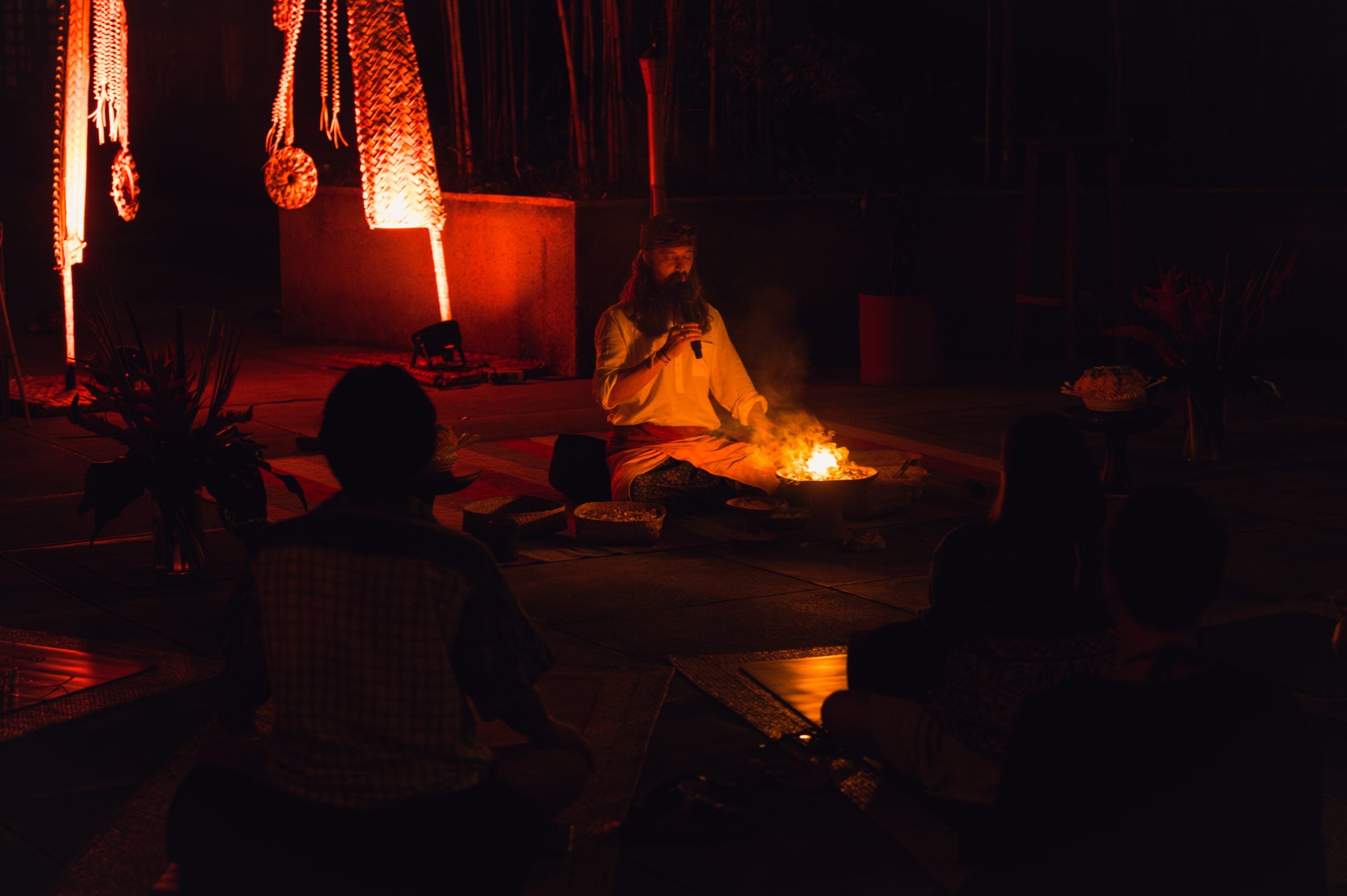
“Merasa has taught me that whenever I feel lost in life, all I need to do is close my eyes to return to a state of tranquillity,” she says. She notes that many people have been conditioned by societal expectations to prioritize the needs of others over their own. This often leads to neglecting their own wellness and personal growth. “The energy and spirit of everyone will always reside deep within my soul, assuring me that I am safe and supported. It has helped me realize that everything I need is already within me.”
Even with the success of co-curating the Merasa Festival and understanding “the gift of the pause” as a necessary component to healing journeys, Badu ponders the state of society that stifles the magic of Black women and girls who are constantly navigating spaces of violence, fear, and unbridled grief and looking for the safety net of self-care as a tool for empowerment. A flash of sadness in her reflective eyes is swiftly replaced with one fiery, defiant command.
“Don’t wait on them, Black girl. You don’t need permission to be beautiful, to have strong willpower, to keep your balance, to be kind to yourself. I think that’s the problem. We think we need permission,” she reasons thoughtfully. “You are already all of the things that you want to be. Practice it for the bad days. We here, we run this, and we don’t need anybody to tell us anymore. Shine for no reason. I give you permission – if you need it.”